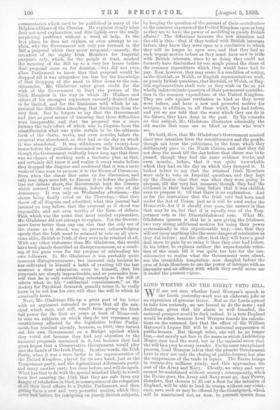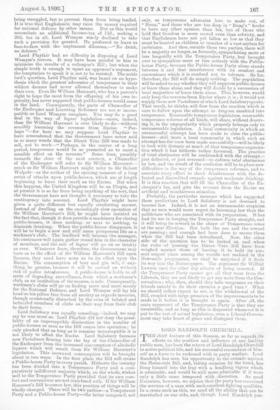LORD WEMYSS AND THE DIRECT VETO BILL.
WE are not sure whether Lord Wemyss's speech in the Lords yesterday-week was an elaborate joke or an expression of genuine terror. But as the Lords agreed to take him seriously, we are bound to do the same ' • and doubtless, given that his alarm is well founded, the national prospect would be dark indeed. It is true England would be sober, because Lord Wemyss founds his calcula- tions on the assumed fact that the effect of Sir William Harcourt's Liquor Bill will be a universal suppression of public-houses. But though sober, she will be no longer free,—not merely not free in the sense in which Archbishop Magee once used the word, but in the material sense that she will be a prey to every invader. For by some unexplained process, Lord Wemyss infers that the present Government 'have in view not only the closing of public-houses, but also the suppression of the trade in liquor. The Excise brings in twenty-five millions yearly, and this approaches the cost of the Army. and Navy. Clearly, an army and navy eannot be maintained without money ; consequently, when the Excise goes, the Army and Navy must go. Any Power, therefore, that chooses to fit out a fleet for the invasion of England, will be able to land its troops without any resist- ance, save such as may be offered by the Coastguard, which will be maintained not, as now, to prevent spirits from being smuggled, but to prevent them from being landed. It is true that Englishmen may raise the money required for national defence by other means. But as this would necessitate an additional Income-tax of 13d., making a 20d. tax in all, Lord Wemyss wisely declined to take such a provision for granted. He preferred to leave us face-to-face with the unpleasant dilemma,—" No drink, no defence."
Lord Playfair had no difficulty in disposing of Lord Wemyss's terrors. It may have been painful to him to minimise the results of a colleague's Bill ; but when the simple truth is enough to upset an opponent's argument, the temptation to speak it is not to be resisted. The noble lord's question, Lord Playfair said, was based on an hypo- thesis which the greatest advocates of temperance in their wildest dreams had never allowed themselves to make their own. Even Sir William Harcourt, who has a parent's right to hope the most from the offspring of his own in- genuity, has never supposed that public-houses would cease in the land. Consequently, the parts of Chancellor of the Exchequer and Licensing Reformer are not se incom- patible as Lord Wemyss imagines. You may do a good deal in the way of liquor legislation—more, indeed, than Sir William Harcourt is ever likely to do—without sensibly lessening the revenue from Excise. " Per- haps "—for here we may suppose Lord Playfair to have remembered that the Government have never said in so many words that the Direct Veto Bill was made to sell, not to work—" Perhaps, in the course of a long period, temperance would be so promoted as to exert a sensible effect on the revenue." Some time, possibly towards the close of the next century, a Chancellor of the Exchequer will refer to Sir William Harcourt— much as Sir William Harcourt might refer to Sir Robert Walpole—as the author of the opening measure of a long series of attacks upon public-houses, which are at length beginning to leave their mark on the Excise. But when this happens, the United Kingdom will be an Utopia, and at present it is so far from being anything of the sort, that the Government have not thought it necessary to take the contingency into account. Lord Playfair might have given a quite different but equally comforting answer. Instead of dwelling on the exceedingly slow operation of Sir William Harcourt's Bill, he might have insisted on the fact that, though it does provide a machinery for closing public-houses, it does nothing, or next to nothing, to diminish drinking. When the public-house disappears, it will be to begin a new and still more prosperous life as a workmen's club. The landlord will become the manager, his customers will again gather round him in the character of members, and the sale of liquor will go on as briskly as ever. Whatever fears, therefore, the Government may have as to the effect of Sir William Harcourt's Bill upon licences, they need have none as to. its effect upon the Excise. The consumption of beer and gin will, if any- thing, 'be greater, because it will be carried on without risk of police interference. A public-house is liable to all sorts of degrading surveillance, from which a workman's club, as an institution of the masses, is safe. Consequently, workmen's clubs will go on finding more and more money for the National Defence, and Lord Wemyss will lay his head on his pillow free from all anxiety as regards invasion, though occasionally disturbed by the cries of belated and befuzzled members of clubs on their way from their club to their home.
Lord Salisbury was equally consoling,—indeed, wo may say he was more so. Lord, Playfair did not deny the possi- bility of an imperceptible diminution in the number of public-houses as soon as the Bill comes into operation ; he only pleaded that as long as it remains imperceptible it is not likely to affect the Excise. Lord Salisbury foresees new Pactoluses flowing into the lap of the Chancellor of the Exchequer from the increased consumption of alcoholic liquors which will result from Sir William Harcourt's legislation. This increased consumption will be brought about in two ways. In the first place, the Bill will Create a Public-house Party in every parish. Hitherto the country has been divided into a Temperance Party and a com- paratively indifferent majority which, on the whole, wishes well to the Temperance Party provided that its own com- fort and convenience are not interfered with. If Sir William Harcourt's Bill becomes law, this position of things will be wholly changed. There will be tivo parties—a Temperance Party and a .Public-house Party—the latter composed, not only, as temperance advocates love to make out, of " Bung," and those who are too deep in " Bung's " books to have any other opinion than his, but of those who hold that freedom is more sacred even than sobriety, and that Englishmen have not yet fallen so low as that they must be treated as children or inmates of a vast asylum for inebriates. And then, outside these two parties, there will be a majority no longer, as formerly, sympathising more or less languidly with the Temperance Party, but brought over to sympathise more or less actively with the Public- house Party, because the Public-house Party alone stands between it and that interference with its comfort and convenience which it is resolved not to tolerate. So far, therefore, the Bill will do simply nothing. The population will be asked to say whether they will suppress public-houses or leave them alone, and they will decide by a succession of local majorities to'leave them alone. This, however, would only keep the revenue from Excise where it is ; it would not supply those new Pactoluses of which Lord Salisbury speaks. That result, he thinks, will flow from the reaction which is sure to follow upon the attempt to dragoon mankind into temperance. Reasonable temperance legislation, reasonable temperance reforms of all kinds, will share, without deserv- ing it, in the unpopularity which properly belongs only to unreasonable legislation. A local community in which an unsuccessful attempt has been made to close the public- houses—still more a local community in which such an attempt has for once been made successfully—will be likely to look with distaste at much of that temperance organisa- tion which it has hitherto rather favoured. The practice of total abstinence will be confounded with the attempt— just defeated, or just reversed—to enforce total abstinence by law, and the result of the confusion will be to place new difficulties in the way of the temperance reformer, and to associate every effort to check drunkenness with the de- feated and discredited crusade against moderate drinking. It is this reaction that will fill the Chancellor of the Ex- chequer's lap, and give the revenue from the Excise an artificial and mischievous stimulus.
Probably, the particular measure which has suggested these predictions to Lord Salisbury is not destined to become law. Indeed, it is not an unreasonable suspicion that no men would more regret its becoming law than the politicians who are associated with its preparation. It has had its use in keeping the Temperance Party straight, and it will bring its reward in the shape of Temperance votes at the next Election. But both the use and the reward are passing ; and enough had been done to secure them when the Bill had been introduced. Now, the other side of the question has to be looked at, and when the risks of passing the Direct Veto Bill have been weighed against those of leaving it to hold its pre- sent august place among the worlds not realised in the Newcastle programme, we shall be surprised if it finds its way into the Notice-paper. The argument Sir Wilfrid Lawson used the other day admits of being inverted. If the Temperance Party cannot get all they want from the Liberals, they are not likely to get any more from the Con- servatives ; why, then, should they take vengeance on their friends merely to do their enemies a good turn ? What we should rather expect to see, is the withdrawal of the Bill, coupled with large promises of the improvements to be made in it before it is brought in again. After all, the main argument of the Temperance Party is that they are irresistible, and so long as this is disproved whenever it is put to the test of actual legislation, even a Liberal Govern- ment may take heart of grace and disregard them.



































 Previous page
Previous page